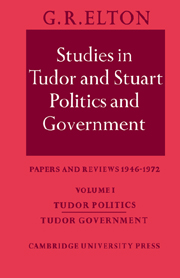Book contents
- Frontmatter
- Contents
- Preface
- Acknowledgments
- Abbreviations
- 1 The Terminal Date of Caesar's Gallic Proconsulate
- I TUDOR POLITICS
- II TUDOR GOVERNMENT
- 13 The Problems and Significance of Administrative History in the Tudor Period
- 14 The Rule of Law in Sixteenth-Century England
- 15 State Planning in Early-Tudor England
- 16 Henry VII's Council
- 17 Government by Edict?
- 18 Why the History of the Early Tudor Council Remains Unwritten
- 19 Henry VIII's Act of Proclamations
- 20 The Elizabethan Exchequer: War in the Receipt
- General Index
- Index of Authors Cited
14 - The Rule of Law in Sixteenth-Century England
Published online by Cambridge University Press: 03 February 2010
- Frontmatter
- Contents
- Preface
- Acknowledgments
- Abbreviations
- 1 The Terminal Date of Caesar's Gallic Proconsulate
- I TUDOR POLITICS
- II TUDOR GOVERNMENT
- 13 The Problems and Significance of Administrative History in the Tudor Period
- 14 The Rule of Law in Sixteenth-Century England
- 15 State Planning in Early-Tudor England
- 16 Henry VII's Council
- 17 Government by Edict?
- 18 Why the History of the Early Tudor Council Remains Unwritten
- 19 Henry VIII's Act of Proclamations
- 20 The Elizabethan Exchequer: War in the Receipt
- General Index
- Index of Authors Cited
Summary
Interest has recently revived in a slightly old-fashioned problem, the essential character of the Tudor state. The problem is less artificial than might be supposed. Of course, there is always something artificial about any attempt to establish a generalized identity for over a hundred years of history; there is danger in any formulation which necessarily ignores the changes brought by time; and there may well be deficiencies in an analysis which turns away from the realities of social relationships to the abstractions of legal and political thought. Nevertheless, I believe that we are right to inquire by what title the system of government under the Tudors should be described. For one thing, in doing so we attend to matters about which a good many people who lived under that system were concerned to think and write. For another, we need to have a firm grasp of these concepts – the sixteenth century's concepts, not ours – if we are to see the events and personalities of the age aright. Just because it follows more closely the lines of thought that engaged the sixteenth century itself, the discussion is actually nearer the heart of any sound understanding than are even those important inquiries about social structure and mobility, economic transformation, or the role of education which have rightly attracted so much attention of late.
- Type
- Chapter
- Information
- Studies in Tudor and Stuart Politics and GovernmentPapers and Reviews 1946–1972, pp. 260 - 284Publisher: Cambridge University PressPrint publication year: 1974
- 2
- Cited by



